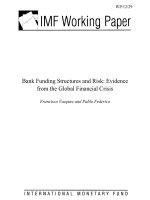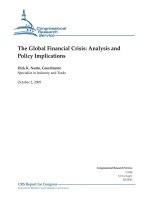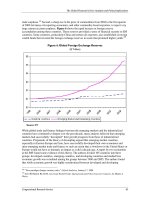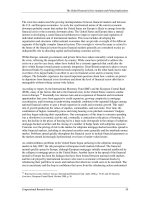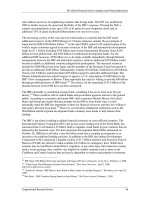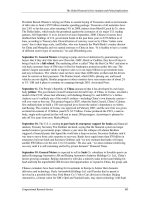de bruin ethics and the global financial crisis; why incompetence is worse than greed (2015)
Bạn đang xem bản rút gọn của tài liệu. Xem và tải ngay bản đầy đủ của tài liệu tại đây (1.12 MB, 244 trang )
Ethics and the Global Financial Crisis
In this topical book, Boudewijn de Bruin examines the ethical ‘blind spots’
that lay at the heart of the global financial crisis. He argues that the most
important moral problem in finance is not the ‘greed is good’ culture, but
rather the epistemic shortcomings of bankers, clients, rating agencies and
regulators. Drawing on insights from economics, psychology and philosophy, De Bruin develops a novel theory of epistemic virtue and applies it to
racist and sexist lending practices, subprime mortgages, CEO hubris, the
Madoff scandal, professionalism in accountancy and regulatory outsourcing of epistemic responsibility. With its multidisciplinary reach, Ethics and
the Global Financial Crisis will appeal to scholars working in philosophy,
business ethics, economics, psychology and the sociology of finance. The
many concrete examples and case studies mean that this book will also
prove useful to policymakers and regulators.
boudewijn de bruin is Professor of Financial Ethics at the University
of Groningen, The Netherlands. He is a consultant with the financial
services industry, has taught in various executive MBA programmes across
the world and is a regular contributor to the media. He runs a large project
on Trusting Banks, with Alex Oliver (University of Cambridge) and financed
by the Dutch Research Council (NWO), which draws together philosophers,
social scientists, policymakers and finance professionals.
Business, Value Creation, and Society
Series editors
R. Edward Freeman, University of Virginia
Jeremy Moon, Copenhagen Business School
Mette Morsing, Copenhagen Business School
The purpose of this innovative series is to examine, from an international
standpoint, the interaction of business and capitalism with society. In the
twenty-first century it is more important than ever that business and
capitalism come to be seen as social institutions that have a great impact
on the welfare of human society around the world. Issues such as globalization, environmentalism, information technology, the triumph of
liberalism, corporate governance and business ethics all have the potential to have major effects on our current models of the corporation and
the methods by which value is created, distributed and sustained among
all stakeholders – customers, suppliers, employees, communities, and
financiers.
Published titles:
Fort Business, Integrity, and Peace
Gomez and Korine Entrepreneurs and Democracy
Crane, Matten and Moon Corporations and Citizenship
Painter-Morland Business Ethics as Practice
Yaziji and Doh NGOs and Corporations
Rivera Business and Public Policy
Sachs and Rühli Stakeholders Matter
Mansell Capitalism, Corporations and the Social Contract
Hemingway Corporate Social Entrepreneurship
Hartman Virtue in Business
Forthcoming titles:
de Bakker and den Hond Organizing for Corporate Social Responsibility
Griffin Managing Corporate Impacts
Knudsen and Moon Visible Hands
Nyberg and Wright Corporate Politics and Climate Change
Ethics and the Global
Financial Crisis
Why Incompetence is Worse than Greed
b o ud e w i j n d e b r ui n
University of Groningen
University Printing House, Cambridge CB2 8BS, United Kingdom
Cambridge University Press is part of the University of Cambridge.
It furthers the University’s mission by disseminating knowledge in the pursuit of
education, learning and research at the highest international levels of excellence.
www.cambridge.org
Information on this title: www.cambridge.org/9781107028913
© Boudewijn de Bruin 2015
This publication is in copyright. Subject to statutory exception
and to the provisions of relevant collective licensing agreements,
no reproduction of any part may take place without the written
permission of Cambridge University Press.
First published 2015
A catalogue record for this publication is available from the British
Library of Congress Cataloguing in Publication data
Bruin, Boudewijn de, 1974–
Ethics and the global financial crisis : why incompetence is worse than greed /
Boudewijn de Bruin.
pages cm. – (Business, value creation, and society)
ISBN 978-1-107-02891-3 (hardback)
1. Financial crises – Moral and ethical aspects. 2. Finance – Moral and ethical
aspects. 3. Business ethics. 4. Global Financial Crisis, 2008–2009 – Moral and
ethical aspects. I. Title.
HB3722.B78 2015
1740 .4–dc23
2014026396
ISBN 978-1-107-02891-3 Hardback
Cambridge University Press has no responsibility for the persistence or accuracy of
URLs for external or third-party internet websites referred to in this publication,
and does not guarantee that any content on such websites is, or will remain,
accurate or appropriate.
for Katja
jezelf een vraag stellen
daarmee begint verzet
Remco Campert, ‘Verzet begint niet met grote woorden’
Contents
Foreword by R. Edward Freeman
page xi
Acknowledgements
xiii
Introduction
1
3
5
7
11
15
Trust and trustworthiness
Moral decision making and moral intensity
Motivation or competence?
Epistemic virtues
Warning and outline
1
Financial ethics: virtues in the market
Friedman’s argument
Corporate responsibility
Shareholders
Job requirements
A theory of the firm
Hierarchy of command
Corporate law
A company’s goals
The economics of banking
An argument for liberty
Politics
Arguments
Epistemic preconditions for liberty
Responsibility
Criticism
Summary
2
Epistemic ethics: virtues of the mind
Instrumental epistemic value
Intellectualism and psychology
Intrinsic or instrumental value?
Motivation and enablement
Courage
Generosity
23
24
25
25
27
28
28
29
31
33
35
37
38
39
40
42
44
45
47
48
50
51
52
53
vii
viii
3
Contents
Epistemic actions
Doxastic voluntarism
Investigation
Doxastic stance
Justification
Epistemic virtues
Courageous soldiers and evil demons
First improvement
Second improvement
Courageous villains
Summary
54
55
56
56
57
60
61
63
64
67
69
Internalizing virtues: the clients
71
75
76
77
79
80
81
82
83
84
85
86
87
88
89
90
91
92
Love
Avoiding elitism
Financial planning
Courage
Justice
Tax advice and functional food
Epistemic injustice
Temperance
Efficiency
Online investing
Humility
CEO hubris
Long-Term Capital Management
Talking about retirement
The meaning of guarantee
Minding your audience
Summary
4
Case study I: primes and subprimes
Costly and complex contracts
Behavioural biases
Epistemic injustice
Love
5
Incorporating virtue: the banks
Corporate entities
Plural subjects and a puzzle
Corporate internal decision structures
Structures, functions, cultures and sanctions
94
95
97
98
100
106
107
108
110
112
Contents
6
Back to the puzzle
Matching virtues to functions
Board roles
Virtues of overconfidence
Organizational support for virtue
Structure
Culture
Sanctions
Organizational remedies against vice
Macro-level remedies
Micro-level remedies
Summary
114
116
117
118
122
124
126
127
129
130
132
137
Case study II: nerds and quants
140
141
143
144
147
Split strikes and Ponzi schemes
Uncovering the fraud
Volatility and diversification
Epistemic virtue
7
Communicating virtues: the raters
Other-regarding epistemic virtues
Generosity
First difference from non-epistemic virtue
Second difference from non-epistemic virtue
Credit ratings
Credit risk: asserting creditworthiness
Monitoring: directing management
Stamps of approval: directing investors
Compromising epistemic virtue
Love
Justice
Temperance
Courage
Generosity
Testimony
Outsourcing epistemic responsibility
Summary
8
ix
Case study III: scores and accounts
Professional accountants
Joint epistemic agents
Codes of conduct
152
155
159
159
160
164
165
166
166
169
172
174
175
176
176
178
181
182
184
185
188
190
x
Contents
Expectation gap
Accounting options
193
194
Conclusion
198
Glossary
202
References
205
Index
222
Foreword
Professor De Bruin has written an important book. For all of the
thousands of pages written on the recent global financial crisis, there
is very little solid ethical analysis of the underlying causes and concepts.
He makes a critical distinction between the motivation of financial
actors and their competence, then argues that most of the analysis of
the crisis has been about motivation. In particular, many have called
into question the very idea of capitalism as seeking to maximize profits
for shareholders. While De Bruin admits that motivation is an important idea, he traces much of the difficulty to incompetence on the part of
multiple stakeholders, who have no real motivation to learn about how
the basic ideas in finance actually work.
This book breaks important theoretical and practical ground. On the
theory front, De Bruin argues that the traditional separation of ethics
and epistemology needs to come to an end. His ideas of ‘epistemic virtue
and vice’ are an important addition to our way of thinking about business and ethics. He draws on some cutting-edge philosophers who are
working out the view that ‘knowledge is virtuously formed true belief’.
He goes on to show that this theory can give us a novel interpretation
of phenomena like the global financial crisis and the recent work in
behavioural economics.
De Bruin speaks to multiple audiences in this book. First of all scholars
in the fields of business and society and business ethics will easily begin to
see how the rich conceptual apparatus of epistemic virtues has application to a broad range of issues. Scholars in management theory and
finance will also be interested in the analysis of how theory can work
better. In addition they will gain insight into the basic relationships in
finance understood in terms of epistemic virtues and values. But De Bruin
also speaks to policymakers. If the main cause of the Great Recession was
incompetence, the implications for policy are profound.
This book represents an important step in the project of rewriting the
story of business so that we come to see business and value creation as
xi
xii
Foreword
firmly enmeshed in society. By taking on one of the most powerful ways
of thinking about business, finance theory and institutions, De Bruin
advances the cause that is behind this series, Business, Value Creation,
and Society. The very purpose of the series is to stimulate new thinking
about value creation and trade, and their role in the world of the twentyfirst century. We need new scholarship that builds on what we know,
yet offers the alternative of a world of hope, freedom and human
flourishing. Boudewijn de Bruin has given us such a book.
R. Edward Freeman
University Professor
University of Virginia
Charlottesville, Virginia, USA
Acknowledgements
I should like to thank Rob Alessie, Alrik Baltus, Ron Beadle, John
Boatright, Tony Booth, Matthew Braham, Ian Carter, Rutger Claassen,
Julian Clarke, Wilfred Dolfsma, Wim Dubbink, Luciano Floridi, Joan
Fontrodona, Martin van Hees, Frank Hindriks, Richard Holton,
Jacques Jacobs, Sue Jaffer, Ronald Jeurissen, Marc Kramer, Matthew
Kramer, Luc Van Liedekerke, Christoph Lütge, Marco Meyer, Seamus
Miller, Nick Morris, Laetitia Mulder, Alex Oliver, Martin O’Neill, Onora
O’Neill, Christoph Prainsack, Jan-Willem van der Rijt, Jan-Willem
Romeijn, Tom Simpson, Alejo Sison, Max Torres, Kees van Veen, David
Vines, and my research assistants Arthur Constandse and Sjoerd Norden.
I have also learnt a lot from the many stimulating and thoughtful
comments I have received from audiences in Amsterdam, Antwerp,
Barcelona, Cambridge, Delft, Doorn, Dublin, Groningen, Hamburg,
Louvain, Madrid, Nyenrode, Oxford, Paris, Pavia, Rotterdam, Tilburg
and Wassenaar.
I should also like to thank Paula Parish and Claire Wood for their
kind help at various stages of the writing process.
The last bits of the book were written while spending time in the
Faculty of Philosophy of the University of Cambridge, and I am very
grateful to the dean, Tim Crane, for his generous hospitality, and to
Alex Oliver for inspiring joint work on our project on trust and finance.
I thank Clare Hall for providing a pleasant and collegial atmosphere for
research.
I gratefully acknowledge generous financial support from the Dutch
Research Council (NWO) for project 360–320–10 Trusting Banks, in
which the universities of Groningen and Cambridge cooperate. This
book is among the first of its outputs.
I acknowledge permission obtained from Damon for reusing
‘Epistemische deugden en de wereldwijde financiële crisis’, Filosofie en
Praktijk, 34, 4 (Winter 2013), 5–13, ISSN 0167–2444; from Springer for
reusing ‘Epistemic virtues in business’, Journal of Business Ethics, 113,
xiii
xiv
Acknowledgements
4 (2013), 583–95, ISSN 0167-4544; from Springer for reusing
‘Epistemically virtuous risk management: financial due diligence and
uncovering the Madoff fraud’, in Christoph Luetge and Johanna
Jauernig (eds.), Business ethics and risk management, Ethical
Economy, 43 (2014), pp. 27–42, ISBN 978-94-007-7440-7; and from
the Philosophy Documentation Center for reusing ‘Epistemic integrity in
accounting: accountants as justifiers in joint epistemic agents’, Business
and Professional Ethics Journal, 32, 1/2 (Spring 2013), 109–30, ISSN
0227-2027.
Introduction
In the Politics, Aristotle tells the tale of Thales the Milesian. Thales is
one of the first philosophers. Bertrand Russell even goes so far as to
write that ‘Philosophy begins with Thales.’1 But he could equally have
written ‘Finance begins with Thales’; for Thales was an early option
trader. The fragment from the Politics where Aristotle recounts Thales’s
story is one of the oldest sources to mention option contracts. Predicting
a rich olive harvest, Thales spent a small amount of money to buy the
exclusive right to use the olive presses; and when his predictions turned
out correct, he sold the right to use the presses to the owners of the olive
yards, with a nice margin.
Aristotle thinks it was Thales’s intention to show the world that
philosophers can effortlessly become as rich as other people, but that
because their ambitions lie elsewhere, they generally do not end up very
rich, which sounds all very good. But wasn’t Thales the first speculator?
With a carefully orchestrated media campaign entitled ‘Banks: Profiting
from Hunger’, Oxfam International calls on banks to stop speculative
trading in food commodities. Food speculation is quite similar to what
Thales did, even if Thales’s financial innovation might today be more
aptly called a lease contract, involving as it does the use of particular
assets, whereas food speculation is about the assets themselves, the
olives not the presses. Oxfam condemns such activities in unequivocal
terms. Food Speculation: A Matter of Life and Death, a film lasting only
fifty-eight seconds, explains why:
Speculation with food commodities causes the price of corn, wheat and rice to
skyrocket. Millions of people in poor countries are being driven into hunger
and poverty. Stop gambling with food – curb speculation!2
1
2
Russell, History, 3.
www.oxfam.org/en/grow/video/2012/food-speculation-matter-life-and-death.
1
2
Introduction
What we now call the global financial crisis, in 2008 we still called
the credit crunch or subprime meltdown. It is true that the year 2008
marks the collapse of Lehman Brothers as well as the rescue of Bear
Stearns, Northern Rock, Merill Lynch, AIG, Wachovia, Fortis, Lloyds,
Royal Bank of Scotland and others. The enormous recessional increase
in unemployment, however, was still far ahead of us, and trust in banks
in the United States was still at a stunning 69 per cent, according to the
renowned Edelman Trust Barometer. Predicting a prolonged recession
would have landed you in a pessimist minority camp. It cannot be
denied therefore that the Dutch Bankers’ Association realized the significance of the 2008 events remarkably quickly. Lehman Brothers had
barely collapsed when a committee led by a respected former banker
started an investigation and published its results only a few months later
in a report entitled ‘Restoring trust’.3 With its exceptionally concrete
suggestions, the report did not fail to have impact. The Banking Code,
published in September 2009, which has been effective as a code of
conduct under civil law since January 2010, is a form of self-regulation
springing directly from that report. The worldwide novelty of a
Hippocratic oath, which bankers and other financials have to pledge,
was suggested by the committee.4 Moreover, the report gave a serious
boost to the development of regulation requiring the financial services
industry to refocus on the interests of its clients.
Yet it is only a very natural question to ask: has this report succeeded
in realizing the goal encapsulated in its title? Has consumer trust in
finance been restored? Before answering this question, it is important
to see that, excepting the eccentric idea of an oath for bankers, the
committee’s attempts are by no means unique in the world. Restoring
trust in banking and finance has been the avowed goal of many government and industry committees around the globe. The US Financial
Crisis Inquiry Commission Report, published in January 2011, is
perhaps the most famous example, but the Turner Review (2009) and
the reports of the Vickers Commission (2011) in Britain and the De
la Rosière report of the European Commission (2009), among many
others, have largely parallel aims.
3
4
Advisory Committee on the Future of Banks in the Netherlands, ‘Restoring
trust’.
Anderson and Escher, The MBA oath, is another well-known initiative.
Trust and trustworthiness
3
Trust and trustworthiness
Consumer trust in banks in 2008 was, as stated, 69 per cent in the
United States. In Europe it was lower, at 56 per cent in the Netherlands
and 47 per cent in the United Kingdom, for example. But five years later
it had declined across the board, as witnessed by figures of 49 per cent in
the United States, 31 per cent in the Netherlands and a quite scarifying
22 per cent in the United Kingdom.5 There is no way to escape the
conclusion: trust has declined. Restoring trust has totally failed so far.
But this statement may be unduly hasty. The figures have to be interpreted with care, and when trust has left on horseback, it will only return
on foot. Perhaps banks need more time. Besides that, we must distinguish
between general trust in the banking industry and the trust people place
in the bank they bank with. If distrust were as widespread as the statistics
claim, many people would keep their money under the mattress. This is
something they seem to avoid doing.
More can be gained by looking closely into the concept of trust. Trust,
to begin with, is a relation. Mary trusts John. Mary trusts the bank.
Person X trusts person or organization Y. The truster and the trustee are
not the only elements of the relation. Mary trusts John with something –
with the car, for instance. And Mary does not trust John with something
else – the dog, for instance. A third relatum is, in addition to all this, the
sort of actions Mary trusts or does not trust John to perform. Nor is that
all. As Onora O’Neill observes, we are particularly interested in placing
trust ‘intelligently’, and that requires the truster to have good reasons to
trust the trustee.6 Mary trusts John with the car but not the dog because
she knows John is a careful driver but not a canophilist.
The observation that rightly placed trust requires good reasons immediately directs our attention to a concept that is probably even more
important: trustworthiness.7 Mary trusts John with the car on account
of her having reasons to believe that John is trustworthy with the car,
but she does not trust him with the dog because she has evidence that
with respect to pet sitting he is untrustworthy. For banks and bankers
to restore trust, then, requires first of all that they regain their
5
6
7
Edelman Trust Barometer 2013.
O’Neill, ‘Trust, trustworthiness, and accountability’. Also see Manson and
O’Neill, Rethinking informed consent in bioethics.
For a brief summary of O’Neill’s position, see www.bbc.co.uk/news/magazine20627410.
4
Introduction
trustworthiness. This is not mere wordplay. Take the idea of a
Hippocratic oath for bankers, or the MBA oath developed by Harvard
Business School graduates several years ago.8 To claim that an oath will
help restore confidence among consumers throughout society is to claim
something that has great initial plausibility. But to claim that an oath will
raise the trustworthiness of bankers or general managers betokens a
naive sort of optimism concerning the behavioural effects of oath taking.
If I had to summarize all this in two words, they would be: trustworthiness first. A frequently used way to analyse trustworthiness is
that it depends on two things, namely, the trustee’s motivation and the
trustee’s competence. Take medicine. What makes a GP trustworthy?
First, the doctor has to be motivated to help. Physicians primarily
interested in their yachts or the amount of money they earn per hour
will ceteris paribus be less trustworthy than doctors motivated by care,
concern for their patients’ wellbeing, altruism and other related values.
Yet motivation is insufficient on its own. Trustworthy physicians are
also competent. They are capable of making an accurate diagnosis.
They know the side effects of the drugs they prescribe. They recognize
the boundaries of their own capacities and refer their patients to specialists whenever necessary. They see to it that their knowledge is up to
date. A trustworthy medical practitioner, in sum, is both motivated to
help and competent to help.
The analysis of trustworthiness in terms of motivation and competence is attractive thanks to its elegant simplicity; it is also a vantage
point from which I can describe the contribution of this book to ethics
and finance. So far ethicists have almost only focused on things that
have to do with motivation. Corporate social responsibility, corporate
citizenship, stakeholder theory, ethics management, the triple bottom
line of people, planet and profit: all are concerned with ways to describe,
explain, understand, curtail or improve the motivations and intentions
of managers and employees or of entire business organizations. That
these ethics models are themed around motivation is probably not a
controversial observation. What these models do, perhaps with the
exception of ethics management, is to provide ways to call upon businesses to pay attention not only to economic but also other considerations. The triple bottom line adds social and environmental perspectives
to mere economic ones.9 Stakeholder theory opens our eyes to other
8
Anderson and Escher, The MBA oath.
9
Elkington, Cannibals with forks.
Moral decision making and moral intensity
5
parties beyond traditional management theory; it shows managers that
business affects competitors, governments and civil society, besides the
usual four suspects of shareholders, employees, customers and suppliers.10 To the economic concerns of an enterprise, corporate social
responsibility adds the normative expectations that society has concerning its legal, ethical and philanthropic responsibilities.11 The most recent
branch of the tree, corporate citizenship, asks firms to view themselves
as partly contributing to the realization of liberal citizenship rights.12 It
is certainly true that these models facilitate competent ethical decision
making among managers in that they offer ready-made formulas to
determine those concerns of people, organizations or even ecosystems
that they must incorporate in their decisions; and initiatives that follow
from philanthropic corporate social responsibility or from corporate
citizenship may foster competence among many of a business’s stakeholders (a much discussed example in this respect is the British retailer
Marks and Spencer’s ‘Marks and Start’ programme, developed to help
unemployed and homeless people gain experience and work skills).13
Competence is not presented as a specific theme here, though.
Moral decision making and moral intensity
It is only in the multifarious techniques of ethics management that
competence finds a place, however minor that may still be. Ethics management can take many forms, including corporate mission statements,
codes of conduct, ethics training programmes, ethical performance
management systems, ethics audits, ethics and compliance officers, ethics
committees, ethics hotlines, whistle-blower policies and others. More
than in the corporate social responsibility model, these management
techniques do address manager and employee competence. The theoretical underpinnings of these techniques include a theory of ethical decision
making developed by James Rest and a theory of moral intensity developed by Thomas Jones.14 Rest distinguished four stages of ethical decision making. People first have to recognize the decision problem as
one that has a moral dimension to it; they have to see, that is, that their
10
12
13
14
Freeman, Strategic management. 11 Carroll, Business and society.
Matten and Crane, ‘Corporate citizenship’.
Crane and Matten, Business ethics, 77.
Rest, Moral development. Jones, ‘Ethical decision making’.
6
Introduction
actions may influence other people positively or negatively. Secondly,
they have to form an ethical judgement concerning what ought to be
done, which requires them to analyse the situation from a moral viewpoint. Thirdly, they have to establish the moral intention to act in
conformity with what they judged, in the previous stage, to be the right
kind of behaviour. Finally, they have to engage in that behaviour.
Unethical behaviour may result from failures at any of the four stages.
People may fail to recognize, judge, intend or behave. Whether they
succeed or fail depends on motivation and competence, because knowledge or ignorance may as well influence decision making as weakness of
will and feelings of control and responsibility. Competence is evidently
related to the first two stages. Who is unable to recognize ethics where
ethics exist, or who fails to make competent ethical judgements, will
likely fail to act ethically.
Particularly in the context of the financial services industry, a second
theme is relevant: the moral intensity of the ethical issue. An issue’s
moral intensity depends on the magnitude of the consequences of the
actions and the probability with which they arise, as well as on whether
the consequences are concentrated on a group of people or dispersed
among them. Moral intensity also depends on whether there is any
social consensus about the fact that particular actions are good or evil
and whether the consequences and/or people affected by the actions
are socially, culturally, psychologically, physically and temporally close
to the agent. Roughly speaking, when evil consequences are likely or
severe, affect people in close proximity or a large number of people, and
when the agent rightly or wrongly perceives this to be the case, then the
issue’s moral intensity is high.
As Jones convincingly argues, the moral intensity of an issue determines how people proceed at each of the four stages of ethical decision
making. Issues with high moral intensity are more frequently recognized
as moral issues, they will lead to more sophisticated forms of moral
judgement, and they will more often trigger people to form moral
intentions and engage in ethical behaviour. This is relevant to ethics
management in banking and the rest of the finance industry because
unlike the oil industry, the pharmaceutical industry and the nuclear
industry, among others, the financial sector’s main ethical issues often
involve such high levels of detailed technical understanding and
detached engagement that their moral intensity is likely to be perceived
as rather low. The prototypical image of traders working in front of
Motivation or competence?
7
several computer screens illustrates the point: they are unaware of the
consequences of their number-crunching sales techniques. Empirical
studies of moral intensity in banking are, to my knowledge, absent, so
we should tread carefully here; in my view, the hypothesis just ventured
has much to recommend it. The consequences of investment decisions
are often remote and they are dispersed over many people. Probability
estimates are typically hard to make. Moreover, the technical character
of the issues involved means that consensus is often absent.
Trustworthiness will hardly grow where people do not notice ethical
issues, and to notice them, they need competence. The sort of competence that is central to this book, however, is not this sort of ethical
competence. Recall the doctor. The trustworthiness of doctors depends
on the extent to which they are able to recognize and judge ethics and
deal with hard cases involving informed consent or conflicts of interest.
Thinking of the competence of physicians, however, one typically
thinks of their suturing skills and knowledge of intestinal disorders, or
something like that. It is the analogue of these sorts of skills and knowledge in finance that I am interested in here, for two reasons. One is the
surprising dearth of such competence in the financial sector; another is
a recent development in philosophy arising out of a rapprochement
between ethics and the theory of knowledge: the theory of epistemic
virtues.
Motivation or competence?
A lack of motivation rather than a lack of competence is still seen as the
primary moral determinant of the global financial crisis. Titles such as
Alex Brummer’s The crunch: how greed and incompetence sparked the
credit crisis, David Faber’s And then the roof caved in: how Wall
Street’s greed and stupidity brought capitalism to its knees and
William Fleckenstein’s Greenspan’s bubbles: the age of ignorance at
the Federal Reserve may suggest a view focusing both on incompetence
(stupidity, ignorance) and on lack of motivation (greed, etc.). But the
emphasis in these and similar books overwhelmingly lies on motivation,
not competence. And lack of competence there is. First, among customers. Many people across the world have limited knowledge of financial
concepts. About a fifth of adult citizens in Britain are unable to understand compound interest, and consequently fail fully to grasp such
simple products as a savings account. Generally, levels of financial
8
Introduction
literacy, as it is called, are low, and the lower they are, the less likely it is
that people will engage in decent financial planning. American house
owners with little knowledge of finance are more likely to face problems
repaying their mortgages, not because they may have been saddled with
a potentially inappropriate mortgage, but because of issues independent
of the terms of the loan.15 Nor do many people seem to be very interested
in acquiring a knowledge of finance. Though it may take weeks for a
family to decide on a new kitchen, many people do hardly any research
into optimum mortgage terms, often with predictably subprime outcomes.16 In the vocabulary of epistemic virtue theory, customers often
show little curiosity, inquisitiveness or love of knowledge.
But epistemic vice can be found among others than customers alone;
among tax professionals, for instance.17 Tax professionals provide
advice concerning the tax returns of business organizations, estimating
the probability that if a court of justice had to decide, it would rule
favourably. The search technique is disarmingly simple. The professionals try to find judicial precedents. But which precedents? It is only
natural to expect them randomly to select a set of relevant court rulings,
to distinguish positive and negative decisions, and to divide the number
of positive decisions by the total size of the sample. In reality, however,
these professionals do not take a random sample. They suffer from the
confirmation bias, a topic studied in psychology and behavioural economics. The sample they select contains a greater than average number
of positive rulings, as a result of which the probability estimate is going
to be too optimistic, with predictably unpleasant outcomes for the
company filing its tax returns. This is the vice of epistemic injustice –
that is, of showing prejudice towards evidence favouring one side of the
issue.
Lack of competence is sometimes hard to detect. Consider bonuses,
trampled into the mud by many popular writers as a wretched element
of a culture of greed supposedly setting the financial sector apart from
the rest of the world. The existence of bonuses is typically seen as a
prime indicator of an utter lack of motivation among bankers to care
for their clients. But a more intelligent accusation relates them not to
motivation but to competence. A neat mathematical argument shows
15
16
17
Gerardi et al., ‘Mortgage default’.
Courchane et al., ‘Subprime borrowers’.
Cloyd and Spilker, ‘Tax professionals’.
Motivation or competence?
9
that when employees receive performance-based compensation, it
makes it very difficult if not impossible for their managers to determine
whether their professional successes, if they have them, are attributable
to skills or to brute luck. Bonuses establish smoke screens between
employees and managers, thwarting epistemic virtue and making decent
human resource management impossible.
Let me be blunt. Incompetence is likely to be among the key determinants of the global financial crisis. Take mortgage-backed securities, the
infamous results of repackaging mortgages, often subprime, with the
aim of diminishing risk. Medical practitioners prescribing drugs are
expected to understand the risks of the drugs and to have a clear idea
of why it is a good idea for their patients to take them; and before taking
the drugs, patients read instructions they believe to contain all relevant
information, written in ways they can understand. An important form
of risk for buyers of mortgage-backed securities is that the borrowers
of the underlying mortgages fail to repay them. Some will not repay, but
the hope is that this will not happen to all of them, only to a few. The
so-called default correlation must not be too high.
Credit rating agencies are the main researchers of such risks. They
give ratings to bonds and structured debt securities, mortgage-backed
securities among them, ranging from top tier triple A to the D of default.
When it comes to rating corporate and government bonds, their success
rate since the 1920s has been rather impressive; and this is true despite a
number of highly publicized scandals (WorldCom, Enron, Tyco, etc.),
despite the fact that many economists believe that similar levels of accuracy can be gleaned from much cheaper sources (without the purportedly
private information from the issuers that rating agencies claim gives them
their competitive edge), and despite the fact that many commentators find
that the agencies are embroiled in conflicts of interest arising from the fact
that they are paid by the issuers of the securities they rate. Mortgagebacked securities are, however, devastatingly more complex than these
plain vanilla bonds. A corporate bond is just a loan to a firm. A mortgagebacked security is a complex amalgam of thousands of house loans
structured in fancy yet complex tranches, which makes them more difficult to rate. The rating agencies proved unequal to their task. It was
necessary for Moody’s, one of the big three rating agencies, to witness
the first outbursts of the subprime meltdown to realize that in order to
rate mortgage-backed securities it ought to obtain information
about what in reality are only the simplest indicators of a mortgage’s
